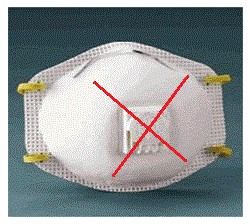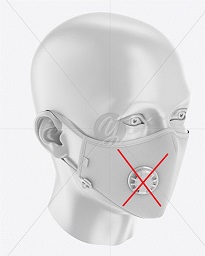Face masks or face coverings must be worn by all staff working on campus when in the presence of others, and in public settings where social distancing is not guaranteed (e.g., hallways, shared work areas, meeting rooms, classrooms, outdoors etc).
When wearing a face mask, you are not wearing the mask to protect yourself, but to minimize the spread of virus containing particles to others. Even if you feel healthy, you may be asymptomatic and spreading virus.
Face masks or face coverings are not a substitute for proper social distancing. You should still practice distancing of 6 feet or more.
Frequently Asked Questions
Will the University provide me with a face mask?
Campus is supplying two washable face coverings for each employee for the fall semester.
Do I have to wear the mask the University provides for me or can I wear another type?
The University is making one type of cloth face mask available. If you prefer to use a different style of cloth mask, you may do so if it is made with multiple layers of cloth, stays on your face without the use of your hands, allows for breathing without restriction, and covers your nose and mouth.
Is the University laundering my mask?
The University is not laundering cloth face masks. It will be the responsibility of the person wearing the mask to clean it.
I use full face protection in my Biosafety Level 2 lab when working outside of the biosafety cabinet. Can I use my cloth face mask instead of my face shield or surgical mask I usually wear?
No. Cloth masks may not be substituted for face shields or surgical masks because those masks are meant to protect your mucous membranes against potential splashes of the material you are working with. However, a face shield can be worn in conjunction with a cloth face covering.
My normal job duties require the use of a respirator. Do I wear a cloth mask instead?
No. If your job duties require the use of a respirator, you should continue to use it. Once you doff the respirator, you should have a cloth face mask nearby to put on. It is important to be aware of the different reasons for wearing the respirator vs. the cloth face mask. If you have questions, contact DRS (drs@illinois.edu).
When I work alone in a shared office, should I wear a face mask?
If you know you will be the only one working in a shared space, you don’t need to wear a face mask. You should keep one readily available in case someone comes in unexpectedly.
Is it acceptable to use a face mask that has an exhalation valve?
No. Cloth face masks with exhalation valves, and disposable respirators with exhalation valves must not be used as face coverings/masks.
An exhalation valve is a one way valve that allows unfiltered respiration to pass through, which negates the main purpose of minimizing the spread of virus-containing particles to others.

Can I use a clear face shield in place of a cloth face mask/covering?
The CDC does not recommend use of face shields for normal everyday activities or as a substitute for cloth face coverings. It is not known if face shields provide any benefit as source control to protect others from the spray of respiratory particles.
Although not a direct substitute, there may be special situations where using a clear face shield is the best option. When a face shield is used for this purpose, additional steps must be taken to mitigate risk.
Special situations would include:
- Essential activities that require access to, or view of, a person’s mouth or nose.
- As a reasonable accommodation via the ADA process for people not able to wear a close-fitting face covering.
If a medical condition or disability impacts your ability to wear a face covering, you may Request a Reasonable Accommodation. For questions, contact the ADA Division of the Office for Access & Equity.
Additional mitigation steps could include one of more of the following:
- Increased physical distancing (e.g. 10 feet vs 6 feet)
- Plexiglass or other types of shielding
- Time limits when physical distancing is restricted (e.g. close contact procedures less than 15 minutes in duration).
Face shields used for this purpose must be large enough to provide complete coverage of the face -extending to below the chin, wrapping around the head to the ears, with no exposed gap between the forehead and the shield’s headpiece.
This approach does not negate other uses of face shields in conjunction with cloth masks, such as providing additional protection to the eyes, and as a barrier to protect the face and cloth mask from splashes or other potential exposures. Face shields provide excellent splash and droplet protection for the wearer of the shield.